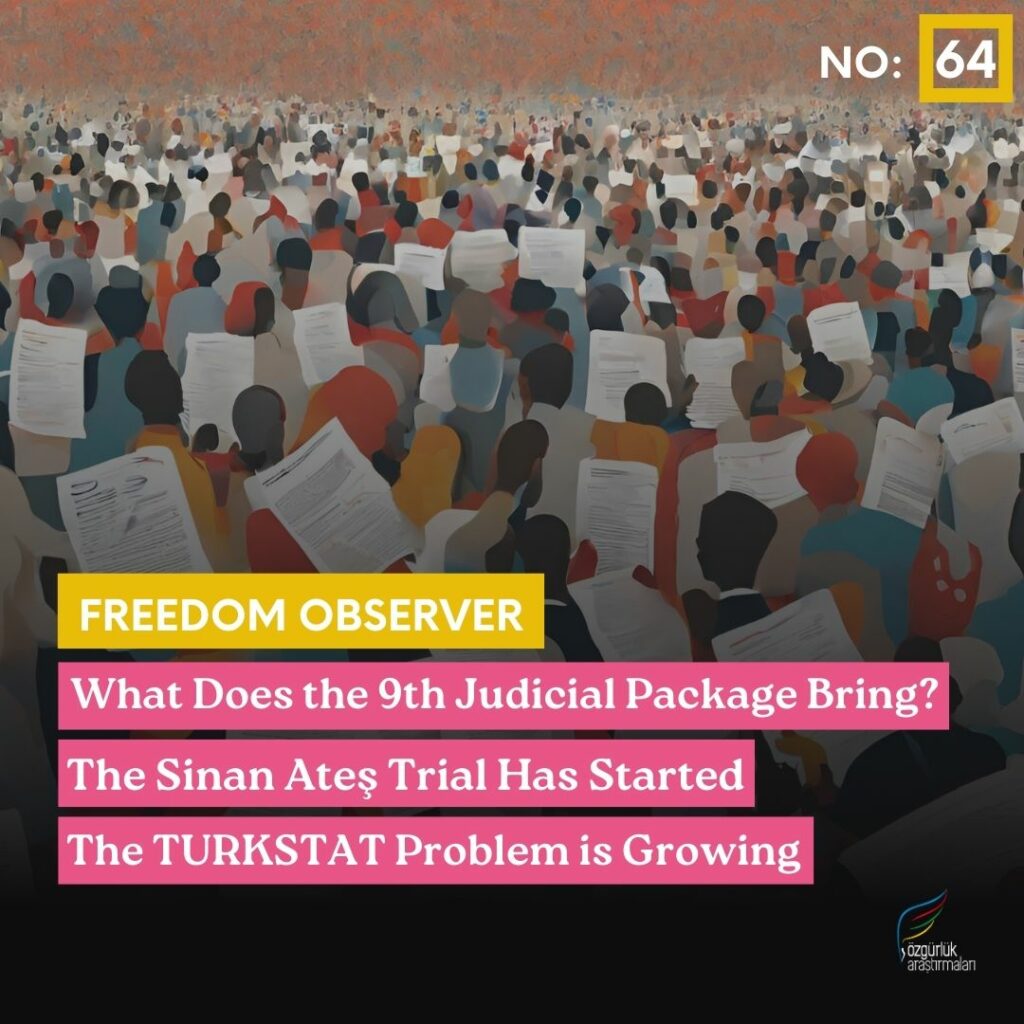
From Editor-in-Chief
The national political agenda has been relatively quiet in the past two weeks. Apart from developments in the Sinan Ateş murder case, which attracted public attention due to its possible links to the MHP, and the “9th Judicial Reform Package” that the government has reportedly been working on for a long time, Turkey’s domestic politics have followed more or less their routine.
Unfortunately, the Sinan Ateş murder trial held earlier this month did not produce a fair verdict that would satisfy the relatives of the deceased Ateş. On the contrary, many defendants were released, and the trial sessions were almost like a theater, according to Ayşe Ateş, who said, “The theater of the conspiracy ended today.” According to the deceased’s wife, “They want to cover this up by saying FETÖ did it.” Sinan Ateş’s mother also expresses her desperation, saying, “Is there a state above this state? Where should I go and ask for justice?” and does not believe that a fair verdict will come out of this trial. The current state of the Sinan Ateş murder case only strengthens the public opinion that the MHP, the ruling partner of the AKP, had a hand in the murder. As a result, no one thinks that the possible connection between the MHP and the Grey Wolves’ Forge in this murder will ever come to light.
What is even more critical in this matter is the following: The fact that the MHP, which is not an official part of the government, is so influential in the judiciary and the state system, in general, raises doubts about whether this party is just a “political party.” This invites everyone who cares about the ideal of a free, democratic, and pluralistic society to think seriously and deeply about the nature of Turkey’s current political regime. Ömer Faruk Şen reviews the latest developments in the Sinan Ateş murder case in the article below.
On the other hand, the 9th Judicial Package, which had been rumored to be enacted for some time, was finally adopted by the Justice Commission of the Parliament without the criticisms and suggestions of the opposition parties being considered by the ruling majority. However, despite claims to the contrary by government circles, this judicial package does not seem to make a substantial contribution to solving Turkey’s “law and justice” problem; on the contrary, it opens the door to new rights violations. The regulations included in this package are either incapable of solving any problem, are contrary to the Constitution, or aim to avoid fulfilling the requirements of the Constitutional Court’s decisions.
In the following article, our lawyer friend A. Rıza Çoban discusses and evaluates these aspects of the issue from a broader perspective. It is necessary to emphasize this much here: The ever-increasing number of judicial packages that this government has issued shows that it lacks a legal staff with specialized knowledge, foresight, and, more fundamentally, an understanding of the rule of law, as it has to change its judicial packages after a short period and repeatedly, or complete their shortcomings. However, without the ideal of the rule of law, issues of law and justice cannot be solved, and it is far from severe to try to grope in these matters.
In the meantime, the AKP-MHP government’s attempts to overcome the severe economic crisis into which Turkey has been plunged by the AKP-MHP government have not been going well, despite the appointment of the much-vaunted Mehmet Şimşek team to manage the economy. Inflation, which is crippling the entire society, especially low-income wage earners and pensioners, except for a small group of “extraordinarily permissive” rentiers who have been fattened by the AKP’s state rents, continues to rise, let alone fall. At this rate, high inflation is likely to become a permanent “structural” element of the Turkish economy. Caner Gerek also contributes to this issue with his article on the problem of inflation and the “TUIK Problem.”
See you in the next issue of Freedom Observer.
* Prof. Dr. Mustafa Erdoğan
What Does the 9th Judicial Package Bring?
The 9th Judicial Package, which the government announced it has been working on for a long time, has been submitted to the Parliament.1 The proposal, titled “Proposal for the Amendment of Certain Laws,” consists of 39 articles, including the practical and executive articles, and envisages amendments to 19 laws.
Rather than providing solutions to the judiciary’s deep-rooted problems, this package mainly introduces new regulations to replace some of the rules annulled by the Constitutional Court. It is noted that the “influence agency” regulation, which was included in the text leaked to the public and caused reactions, is not included in this proposal. We hope this regulation, which would completely shelve the freedoms of expression and association, will not be included in this proposal again during the Commission or General Assembly negotiations.
On the other hand, it is seen that calls for a general amnesty or an execution arrangement and an arrangement to remedy the injustices suffered by those under Statutory Decree Laws were not heeded, and no such arrangement was included in the proposal. However, there is an urgent need for regulation in this regard. The ECtHR has notified the government of three thousand applications in batches of 200 as a continuation of the Yüksel Yalçınkaya judgment. In addition to these, other groups of applications filed by applicants who were tried and sentenced for alleged FETÖ membership have also been notified to the government, and these notifications also include questions regarding Article 7 of the Convention, which regulates the principle of no crime and punishment without law. The likelihood of a violation decision in these applications is very high. In that case, a systemic solution would be inevitable for all FETÖ trials. Therefore, it is imperative for the government to find a solution without waiting for thousands of violation decisions.
A significant part of the regulations in the proposal is related to the issues canceled by the Constitutional Court and includes new regulations by the grounds for cancellation. Since the offense of defamation has become a source of income for many people, hundreds of thousands of defamation complaints are made every year due to social media posts, and prosecutors and courts deal with these complaints. The proposal includes some regulations in this regard. A maximum period of two years is envisaged for filing a complaint. In addition, the practice of reconciliation for the offense of defamation is abolished, and prepayment is introduced. However, it is clear that these regulations will not solve the problem. For a permanent solution, defamation should be completely decriminalized, and those who claim to have been defamed should file a lawsuit for compensation in civil courts.
Article 187 of the Turkish Civil Code No. 4721, which regulates the surname of married women and was annulled by the Constitutional Court, is rearranged with Article 15 of the proposal. However, as we have covered in previous issues of this bulletin, the proposed regulation is the same provision that was annulled by the Constitutional Court. In other words, the government refuses to comply with the Constitutional Court’s decision. This, of course, also means that the ECtHR judgment will not be complied with. As mentioned before, both the ECtHR and the Constitutional Court have ruled that denying married women the right to use the surname they had before marriage alone constitutes gender discrimination. Despite this, the government wants to re-enact the same provision that was annulled by the Constitutional Court.
The preamble of the article states that “Article 41 of the Constitution recognizes that the family is the foundation of Turkish society. Considering the importance of the family, the use of separate surnames by the mother and father may have negative effects on the child, and which surname the child will use will become a separate issue of discussion. This situation may harm the integrity of the family, which is the foundation of Turkish society. For this reason, the provision of the law that was annulled by the Constitutional Court has been reorganized, stating that the married woman will take her husband’s surname, but she can also use her previous surname in front of her husband’s surname if she wishes…”. If the proposal is enacted in its current form, it is clear that this provision will be in violation of the Constitution and international human rights conventions to which Turkey is a party. This text will be annulled again by the Constitutional Court on the grounds that it violates Article 153 of the Constitution (the provision on the binding nature of the Constitutional Court’s decisions), and this provision will not be enforceable as per Article 90 of the Constitution. The courts will decide that women should use their premarital surnames based on international conventions, as they have been doing since 2014.
* Ali Rıza Çoban – Constitutional Lawyer
The Sinan Ateş Trial Has Started
The trial of Sinan Ateş, the former President of the Grey Wolves’ Hearths who lost his life in an assassination attempt in Ankara, started at Ankara 32nd High Criminal Court. Twenty-two arrested defendants appeared before the judge for the first time in the hearing held on July 1. Among the detainees are former executives of the Grey Wolves and MHP members. During the hearing, the shooter, Eray Özyağcı, denied all his statements, while the alleged instigator, Doğukan Çep, claimed that he was “the main actor of the case.” At the hearing where the interim decision was made, ten defendants who were arrested were released on judicial control conditions. Sinan Ateş’s wife, Ayşe Ateş, reacted to the interim verdict by saying, “The theater of conspiracy supported by the press and social media, which witnessed the efforts of the defendants and defense attorneys to reduce a political murder to a case of credit and debit for five days in the Sincan campus, ended today.”
The court also rejected the request to merge the 17 suspects’ separate investigation files with the main case. In the first session of the hearing, the lawyers of the Nationalist Movement Party (MHP) requested to participate in the case. The court unanimously rejected the request for participation on the grounds that “MHP does not have the title of victim of the crime.”
Ayşe Ateş says that since the police statement and the investigation phase, the attempt to shed light on the murder has been hampered by concerns about protecting someone. Ateş stated that the indictment ignored important information about her husband’s death, disregarded the testimonies of some key witnesses, and removed some suspects from the file. She also claimed that there were political reasons behind the dismissal of some prosecutors during the trial. As there has been no satisfactory explanation or investigation into Ayşe Ateş’s allegations, the public has raised serious doubts about the due process of the case.
The murder of Sinan Ateş is one of the most significant incidents of recent years that has damaged the sense of justice, the demand for clean politics, and trust in the judiciary. This murder has shown us how violent political infighting in Turkey can be. The manner in which the investigation and prosecution were carried out also reveals how the rule of law was violated. It has also brought back the traditional issues of the relationship between politics, the judiciary, and the structures within the state. Finally, the unsolved murders that marked our recent political history have been replaced by “forensic” cases whose perpetrators are known but cannot be brought to justice despite social pressure.
* Ömer Faruk Şen – Ph.D. – Missouri University
The TURKSTAT Problem is Growing
TURKSTAT, which has been in the spotlight with its constantly changing management staff and the inflation rates it announces at critical times, has once again been at the center of discussion this week. Ekonomim newspaper columnist Alaattin Aktaş’s July 8 article on TURKSTAT’s product item prices caused quite a stir.2 After this controversial article, TURKSTAT President Erhan Çetinkaya held a press conference the next day to try to clear up the question marks. Still, his answers only raised even more questions.
In his article, Alaattin Aktaş took the consumer goods whose average prices were last announced in April 2022 and brought them to today’s price based on the price changes in the item groups to which the products belong, attempting to roughly show the current prices used by TURKSTAT in product calculations. For example, in April 2022, TURKSTAT announced the average tomato price as 18.53 TL and did not announce product prices afterward. However, TURKSTAT regularly announces the prices for the fruit and vegetable group to which tomatoes belong every month.
According to TURKSTAT, there has been an increase of 54.84% in the fruit and vegetable group from April 2022 to June 2024. Based on this information, Aktaş tried to find the current prices of all fruits and vegetables by extrapolating the 54.84% increase to today and found, for example, the current price of tomatoes to be 28.69 TL. Alaattin Aktaş’s calculation, as if all fruits and vegetables have increased at the same rate, is technically incorrect. Moreover, it is also possible that the average rent is 5844 TL, which is also possible in terms of the inflation calculation method (a situation related to being a tenant or not). What matters in inflation measurement is not the price level but the price change percentage. As a matter of fact, according to TURKSTAT, rents have increased by 314% in this period. But in general, the article still helps to get an idea.
The day after this article, TURKSTAT Governor Erhan Çetinkaya held a press conference that drew a lot of reactions. President Çetinkaya claimed they are one of the countries that announce the inflation rate as early as the third of the month. However, he gave a contradictory answer to why product prices were not announced, saying it was difficult to reach by the third of the month. Previously, the agency had stated that “we prefer not to publish product prices because the announcement of product prices causes misleading interpretations.” This statement noted that it was not announced because it did not reach the third of the month, not due to misinterpretation.
Erhan Çetinkaya, the head of TURKSTAT, made another strange statement: “I think we need to examine what is the difference between inflation at 75% and inflation at 45%. There is no difference. Prices are rising again.” 3 As inflation rises, uncertainties increase, firms have difficulty in pricing and even increase margins by not taking risks against possible increases in costs. Moreover, it is impossible not to see a difference when credit costs rise even more as inflation increases, making many projects unfeasible and further increasing inequality and poverty.
As a matter of fact, all the tightening steps taken by the Central Bank over the last year are aimed at reducing inflation from 70% to 40% by the end of this year.
In addition to these bizarre defenses, the head of TURKSTAT, Çetinkaya, claimed that the rise in prices was due to exorbitant profits, in a sense taking the blame for the increase in prices off the government and putting it on big companies. There is no institutional basis for such a statement, and the institution has neither the authority nor the methodology to determine exorbitant prices. Moreover, blaming the business world contradicts the government’s policies that primarily affect the poor. Erdal Bahçıvan, Chairman of the Board of Directors of the Istanbul Chamber of Industry, reacted to this accusation, which Çetinkaya made by going beyond his duties and authorities as the President of TURKSTAT, summarizing the situation with a tweet: “Instead of going beyond the scope of his duties today and accusing some segments of society about inflation, TURKSTAT should have provided a more convincing explanation to the questions about the inflation calculation method, which was wondered by society in general.”4
As a result, this debate is likely to continue as long as inflation remains high and the public sector’s influence on wages remains significant. Public intervention in wages and prices deepens the inflation problem and undermines confidence in the economy. The new economic administration, in particular, and the government, in general, suffer from this loss of confidence.
* Dr. Caner Gerek
1 https://cdn.tbmm.gov.tr/KKBSPublicFile/D28/Y2/T2/WebOnergeMetni/c3d4bbf9-eb20-4e80-ac3d-e7772a54c139.pdf
2 https://www.ekonomim.com/kose-yazisi/iste-tuikin-devlet-sirri-gibi-sakladigi-madde-fiyatlari/753114
3 https://www.bloomberght.com/tuik-baskani-acikladi-haziran-enflasyonu-neden-dusuk-geldi-2356103
4 https://x.com/erdal_bahcivan/status/1810699426211545248





